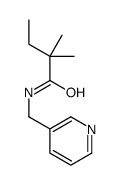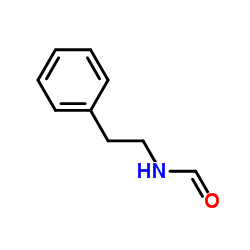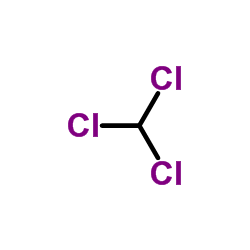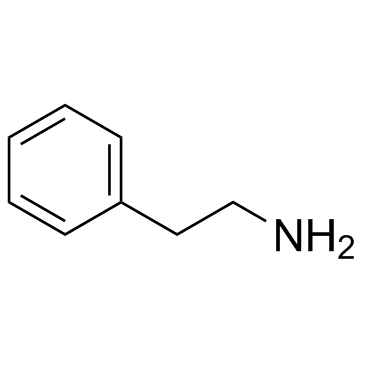59795-89-0
| Name | (2-isocyanoethyl)benzene |
|---|---|
| Synonyms |
HANSA ISN-0141
MFCD02664670 Phenylethyl isocyanide(2-Isocyanoethyl)benzene 2-Phenylethylisocyanid Phenylethyl isocyanide 2-phenethyl isocyanide 2-PHENYLETHYL ISOCYANIDE |
| Density | 0.95 |
|---|---|
| Boiling Point | 52ºC (2.2503 mmHg) |
| Molecular Formula | C9H9N |
| Molecular Weight | 131.17400 |
| Exact Mass | 131.07300 |
| LogP | 1.37910 |
| Index of Refraction | 1.518-1.52 |
| Storage condition | Refrigerator (+4°C) |
Synonym:(2-Isocyanoethyl)benzen Section 2 - COMPOSITION, INFORMATION ON INGREDIENTS
Risk Phrases: 20/21/22 36/37/38 Section 3 - HAZARDS IDENTIFICATION EMERGENCY OVERVIEW
Harmful by inhalation, in contact with skin and if swallowed. Irritating to eyes, respiratory system and skin. Potential Health Effects Eye: Causes eye irritation. Skin: Causes skin irritation. Harmful if absorbed through the skin. Ingestion: Harmful if swallowed. May cause irritation of the digestive tract. Inhalation: Harmful if inhaled. Causes respiratory tract irritation. Chronic: Not available. Section 4 - FIRST AID MEASURES Eyes: Flush eyes with plenty of water for at least 15 minutes, occasionally lifting the upper and lower eyelids. Get medical aid. Skin: Get medical aid. Flush skin with plenty of water for at least 15 minutes while removing contaminated clothing and shoes. Ingestion: Get medical aid. Wash mouth out with water. Inhalation: Remove from exposure and move to fresh air immediately. If not breathing, give artificial respiration. If breathing is difficult, give oxygen. Get medical aid. Notes to Physician: Treat symptomatically and supportively. Section 5 - FIRE FIGHTING MEASURES General Information: As in any fire, wear a self-contained breathing apparatus in pressure-demand, MSHA/NIOSH (approved or equivalent), and full protective gear. Will burn if involved in a fire. Extinguishing Media: Use water spray, dry chemical, carbon dioxide, or chemical foam. Section 6 - ACCIDENTAL RELEASE MEASURES General Information: Use proper personal protective equipment as indicated in Section 8. Spills/Leaks: Absorb spill with inert material (e.g. vermiculite, sand or earth), then place in suitable container. Section 7 - HANDLING and STORAGE Handling: Avoid breathing dust, vapor, mist, or gas. Avoid contact with skin and eyes. Storage: Store in a cool, dry place. Store in a tightly closed container. Section 8 - EXPOSURE CONTROLS, PERSONAL PROTECTION Engineering Controls: Facilities storing or utilizing this material should be equipped with an eyewash facility and a safety shower. Use adequate ventilation to keep airborne concentrations low. Exposure Limits CAS# 59795-89-0: Personal Protective Equipment Eyes: Not available. Skin: Wear appropriate protective gloves to prevent skin exposure. Clothing: Wear appropriate protective clothing to prevent skin exposure. Respirators: Follow the OSHA respirator regulations found in 29 CFR 1910.134 or European Standard EN 149. Use a NIOSH/MSHA or European Standard EN 149 approved respirator if exposure limits are exceeded or if irritation or other symptoms are experienced. Section 9 - PHYSICAL AND CHEMICAL PROPERTIES Physical State: Clear liquid Color: light yellow Odor: stench pH: Not available. Vapor Pressure: Not available. Viscosity: Not available. Boiling Point: 52 deg C @3hPa Freezing/Melting Point: Not available. Autoignition Temperature: Not available. Flash Point: Not available. Explosion Limits, lower: Not available. Explosion Limits, upper: Not available. Decomposition Temperature: Solubility in water: Insoluble. Specific Gravity/Density: 0.950 Molecular Formula: C9H9N Molecular Weight: 131.18 Section 10 - STABILITY AND REACTIVITY Chemical Stability: Not available. Conditions to Avoid: Incompatible materials. Incompatibilities with Other Materials: Strong oxidizing agents. Hazardous Decomposition Products: Carbon monoxide, oxides of nitrogen, carbon dioxide. Hazardous Polymerization: Has not been reported Section 11 - TOXICOLOGICAL INFORMATION RTECS#: CAS# 59795-89-0 unlisted. LD50/LC50: Not available. Carcinogenicity: Phenylethyl isocyanide - Not listed by ACGIH, IARC, or NTP. Section 12 - ECOLOGICAL INFORMATION Section 13 - DISPOSAL CONSIDERATIONS Dispose of in a manner consistent with federal, state, and local regulations. Section 14 - TRANSPORT INFORMATION IATA Shipping Name: TOXIC LIQUID, ORGANIC, N.O.S.* Hazard Class: 6.1 UN Number: 2810 Packing Group: III IMO Shipping Name: TOXIC LIQUID, ORGANIC, N.O.S. Hazard Class: 6.1 UN Number: 2810 Packing Group: III RID/ADR Shipping Name: TOXIC LIQUID, ORGANIC, N.O.S. Hazard Class: 6.1 UN Number: 2810 Packing group: III Section 15 - REGULATORY INFORMATION European/International Regulations European Labeling in Accordance with EC Directives Hazard Symbols: XN Risk Phrases: R 20/21/22 Harmful by inhalation, in contact with skin and if swallowed. R 36/37/38 Irritating to eyes, respiratory system and skin. Safety Phrases: WGK (Water Danger/Protection) CAS# 59795-89-0: No information available. Canada None of the chemicals in this product are listed on the DSL/NDSL list. CAS# 59795-89-0 is not listed on Canada's Ingredient Disclosure List. US FEDERAL TSCA CAS# 59795-89-0 is not listed on the TSCA inventory. It is for research and development use only. SECTION 16 - ADDITIONAL INFORMATION N/A |
| Hazard Codes | Xn |
|---|---|
| Risk Phrases | R36/37/38 |
| Safety Phrases | S26-S36-S37-S39 |
| HS Code | 2926909090 |
|
~94% 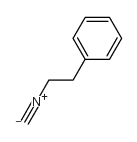
59795-89-0 |
| Literature: Guirado, Antonio; Zapata, Andres; Gomez, Jesus L.; Trabalon, Luis; Galvez, Jesus Tetrahedron, 1999 , vol. 55, # 31 p. 9631 - 9640 |
|
~% 
59795-89-0 |
| Literature: Grolla, Ambra A.; Podesta, Valeria; Chini, Maria Giovanna; Di Micco, Simone; Vallario, Antonella; Genazzani, Armando A.; Canonico, Pier Luigi; Bifulco, Giuseppe; Tron, Gian Cesare; Sorba, Giovanni; Pirali, Tracey Journal of Medicinal Chemistry, 2009 , vol. 52, # 9 p. 2776 - 2785 |
|
~62% 
59795-89-0 |
| Literature: Cao, Haiping; Liu, Haixia; Doemling, Alexander Chemistry - A European Journal, 2010 , vol. 16, # 41 p. 12296 - 12298 |
|
~48% 
59795-89-0 |
| Literature: Hess, Ulrich; Brosig; Komenda; Schaefer Pharmazie, 1999 , vol. 54, # 6 p. 412 - 417 |
| HS Code | 2926909090 |
|---|---|
| Summary | HS:2926909090 other nitrile-function compounds VAT:17.0% Tax rebate rate:9.0% Supervision conditions:none MFN tariff:6.5% General tariff:30.0% |
